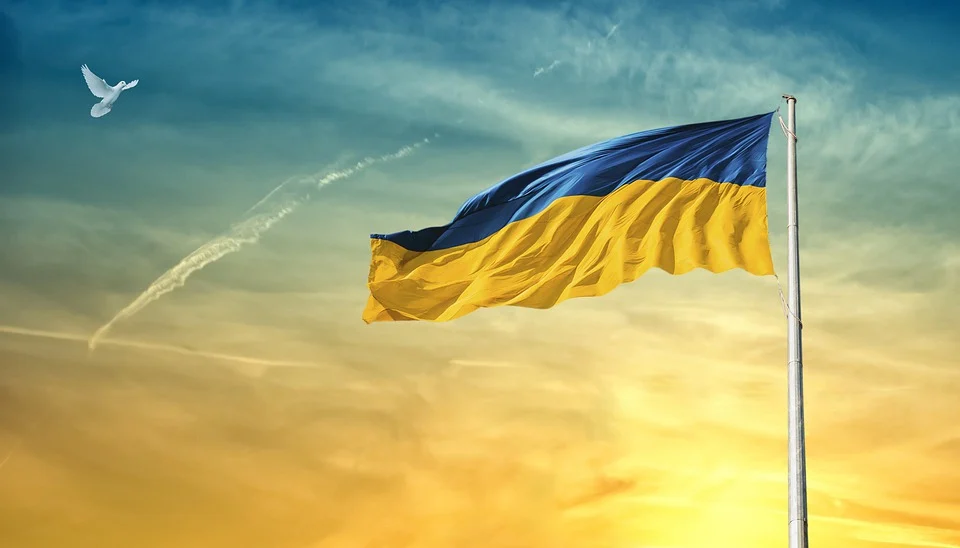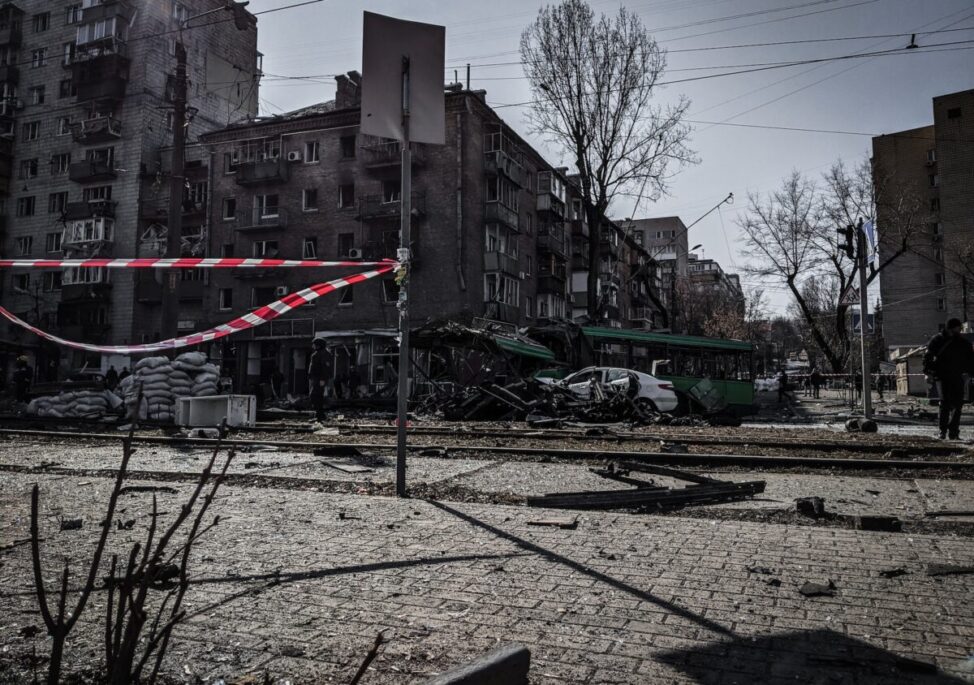After the start of the war, more than 100 cases of persecution of religious organizations, their clergy and congregations were registered in the occupied territories. And this does not include almost 600 destroyed churches and religious centers during the attacks against Ukrainian cities and villages. In its research, “Vjorstka” counted searches, kidnappings, interrogations with torture, evictions, seizures and destruction of buildings.
Key takeaways from the longread:
- “Vjorstka” found at least 109 acts of pressure against clergy and religious figures of five religious denominations.
- Most often, Orthodox Christians and Protestants fell under repression.
- At least 43 clerics faced repression: in eight of them the clergy were captured and in five they were killed.
- In at least 66 cases, the buildings of churches, mosques, religious centers and related organizations were confiscated, looted and destroyed. In their place, the military placed weapons depots, and the pro-Russian authorities opened police departments, National Guard and United Russia offices.
- The reason for the repressions was, among other things, the Ukrainian language, the refusal to support pro-Russian authorities and the Russian Orthodox Church.
Five denominations
Russian forces and occupation authorities persecuted at least five religious denominations: Orthodox Christians, Catholics, Protestants, Muslims, and Jehovah’s Witnesses. There is no information about Buddhists and Jews.
Moreover, in the case of Orthodox Christians, pressure was applied both to the clergy of the Ukrainian Orthodox Church (OCU), which became independent from the Patriarchate of Constantinople in 2019, and to the clergy of the Ukrainian Orthodox Church of the Moscow Patriarchate. (UOC-MP). The latter is often accused in Ukraine of ties to Russian authorities during the war, despite the fact that last May the UOC expressed no confidence in the Moscow Patriarchate and also declared its “complete independence” from it.
Nevertheless, if you compare the pressure on the Orthodox in the occupied regions of Ukraine, this pressure is many times less compared to the UOC. Based on the “Vjorstka” research, the occupying forces persecuted the UOC clergy and their objects at least 9 times, and 23 cases were recorded in the case of the OCU.
In at least 39 cases, Protestants – Pentecostals, Baptists, Lutherans, Mennonites, Charismatics – fell under repression. At least 18 acts of religious repression were committed against members of the Jehovah’s Witnesses movement who are banned in Russia. At least 14 — against Catholics. In at least four cases, Muslims were the victims of repression. In four other cases, the confessional affiliation of the victims was not specified.
According to “Vjorstka” analysis, residents of eight Ukrainian regions reported such persecution: Zaporizhye (47 cases), Kherson (20 cases), Luhansk (13 cases), Donetsk (11 cases), Kyiv (9 cases), Kharkiv (5 cases), Chernigov (3 cases) and Odessa (1 case).
According to the Institute for Religious Freedom, during the year of the war (by February 2023), more than 500 religious buildings were damaged or completely destroyed as a result of shelling. “Vjorstka” did not take into account in its analysis those cases where religious buildings came under mass bombing because it was impossible to assess whether the attack on specific objects or people was intentional.
What happened to the clergy?
“Vjorstka” found 43 acts of targeted persecution of clergy from media websites and also from reports of human rights activists. As a result, in 18 cases they were forced to flee the city, go underground or stop their activities altogether. In 12 cases, they were forcibly deported. On another eight occasions the clergy were captured and in five cases killed.
Interrogations, kidnappings and deportations
According to Viktor Sergeev, the pastor of the Melitopol Christian Church, on the night of March 2022, the military surrounded his house and he, along with other clergymen and parishioners who lived in the neighborhood, were taken to their church for questioning. Sergeev later told reporters that the military demanded that he would write the word “Russia” on the building and call on parishioners not to participate in anti-occupation rallies. They also asked: “Do you love Russia?”, “How fucked up is your drug-addicted president” and so on.
On the same night, the youth pastor of the church, Mark Sergejev, was also interrogated. Later, he said that when the military broke into his house at night, his eldest son woke up to the beam of a laser aimed at him. The next day, after nightly searches and interrogations, church workers and some parishioners left the city, fearing further persecution.
In March 2022, during the Mariupol attacks, the pastor of the Baptist church, Mikhail Reznikov, and its clergyman, Andrei Fomenko, were detained by the Russian military when they went to get food for people sheltering from shells in the church. In September 2022, security forces kidnapped the pastor of another Baptist church and his wife also in Mariupol because they refused to use their church building for the referendum.
The Melitopol Greek Catholic priest Alexander Bogomaz was interrogated before he was deported more than seven times, each time he was forced to accept a Russian passport, he told reporters.
“They talked to me as if I were something lower than this world and they were the masters in my house, church and congregation,” he recalled. “Apparently I was condemned and there was an informer: apparently someone complained. We fed up to 30 homeless people every day and someone turned me in. During the interrogations, I heard quotes from which it was clear: someone passed on information about me. I don’t even want to know who it was.”
Torture
Residents of the occupied territories said that in addition to insults and death threats, they were beaten during such interrogations and detentions, and were kept without access to water, food, and toilets.
Rustem Asanov, imam of the Crimean Tatar religious community “Birlik” from the village of Schastlivtsevo, Kherson region, told human rights activists about how the military tortured him for several days in a basement of the village, suspecting him of ties to the Ukrainian armed forces.
“They hit me with something hard – probably a machine gun – in the ribs and on the back, as well as the lower back. They hit me to the ground to make me fall, and the handcuffs tightened around my wrists even more – it caused me unbearable pain,” the imam recalled in a conversation with human rights activists. “They said: “That’s it with Ukraine, forget about this country, we will soon destroy all of Ukraine.”
Pyotr Krivitski, priest of the Melitopol Greek Catholic Church, also spoke about the beatings. He was arrested in the churchyard at the end of November, after which he was expelled from the city. He lived in the occupation for more than 9 months.
“A car drove into the yard. There were six of them. People in black uniforms closed the gates and immediately started beating me and forced me to my knees. My knee hurt, the right foot was very painful, there were bruises on the back,” the priest said later in an interview. — “The workers were taken to the street. One of them said something and they hit his head against the wall and beat him bloody.”
Imprisonment
In some cases, such interrogations resulted in the imprisonment of clerics. Chaplain Vassili Virozub, a priest of the Odessa diocese, spent 70 days in a colony in the Belgorod region. He was detained as part of the crew of the rescue ship “Sapphire”, which was supposed to remove the bodies of Ukrainian soldiers from the island of Zmeiny.
Reverend Ivan Levitsky of the Greek Catholic Church from Berdyansk was detained on November 16 after a search in the church and taken away in an unknown direction. A week later, Russian pro-government media reported that ammunition was allegedly found with Levitsky and another church clergyman. There is no confirmation of this. The whereabouts of the pastor and church minister remains unknown.
Mariupol pastor Vladislav Šabanets was detained on March 21 while evacuating local residents from the city and sent to a colony in Jelenovka. He spent more than 105 days in captivity.
Murders
Targeted killings of clergy were recorded in at least three regions – Donetsk, Kyiv and Kherson. At least five such incidents have been reported in the media and in human rights reports.
In Jasnogorka, Kyiv region, OCU priest Rostislav Dudarenko was shot to death when he came from his hiding to the soldiers with a cross in his hand. In Bucha, OCU priest Myron Zvarychuk was killed when he was on his way to bring humanitarian aid.
Anatoly Prokopchukov, a deacon of the evangelical church, and his 19-year-old son Alexander were shot dead in Novaya Kakhovka. Their bodies were found five days after their detention in a forest near the city.
What happened to the churches?
“Vjorstka” analysis showed that the military and pro-Russian authorities attacked the buildings of churches, mosques, religious centers and related organizations at least 66 times. As a result, 45 buildings were seized or confiscated, and another eight were looted and searched without confiscation. In three cases they were destroyed.
Confiscation
Most often – in 45 registered acts – it was precisely the seizure and confiscation of the buildings of religious organizations. In all cases it was preceded by a search. As a rule, the military organized the locations of churches, temples, houses of worship and related organizations as their headquarters or handed over the buildings to the local pro-Russian administration. They, in turn, opened police stations, branches of “United Russia” instead of church buildings, and in some cases handed over objects to the Russian Orthodox Church (VÕK).
Thus, after confiscation, the Church of the Intercession of the Holy Theotokos in the village of Stroganovka, Zaporizhia region, was handed over to the ministers of the Russian Orthodox Church. According to the press, in the village of Chkalovo, half an hour’s drive from Stroganovka, after closing the Baptist prayer house, the soldiers announced to the people that “after the referendum, not a single sect will exist in the village except the Orthodox Church.”
In Molotchansk, the offices of “United Russia” were opened in the buildings of the conquered Mennonite church and charity foundation. In Melitopol, the Word of Life church building was handed over to the police station. And in the Christian church of Melitopol, once important for the city, the Ministry of Youth, a cultural and sports entertainment complex and a branch of the Russian Guard moved into it after the occupation
“There were 200 soldiers around the church,” Viktor Sergejev, pastor of the Melitopol Christian Church, said later in an interview. “They drove in, breaking the barrier and the gate. A shameful assault, a search of the building began.”
The Church of the Ascension of the Lord in Lukashovka, Chernihiv Region, which belonged to the Moscow Patriarchate, was used by the military as their headquarters. After the village was liberated, dead and tortured bodies of local residents were found in the church building. The Church of the Mother of God Pochajevskij Icon of Bucha was adapted by the Russian troops as an ammunition depot. In addition to their positions and warehouses, the military opened a crematorium at the Tauride Christian Institute in the Kherson region.
As human rights activists explain, international humanitarian law prohibits the use of (religious) buildings of worship “to support military efforts”. When armed forces establish their positions, headquarters and warehouses in churches, they turn a protected religious building into a legitimate military target.
Looting and destruction
Churches and their associated premises were often looted. During the occupation of the town of Koryukovka in the Chernihiv region, CCTV cameras captured how soldiers broke a window in a church and took food out of it. In the village of Vorzel, Kyiv region, a local theological seminary was robbed in the same way, and the chapel belonging to it was used as a toilet.
In some cases, religious buildings were completely destroyed: they were precision bombed and burned to the ground. In this way, according to the media, the building of the OCU Archangel Michael Church in the village of Tishki, Vene, in the Kharkiv region, was looted and burned to the ground during the fall retreat. In Severodonetsk, the military deliberately fired incendiary cartridges at the Islamic center “Bismillah”.
Reasons for repression
The Ukrainian language and the refusal to support the Russian Orthodox Church.
As the analysis of “Vjorstka” showed, the reason for the repression against religious figures was the support of the Ukrainian authorities as well as the Ukrainian language used in religious services.
In Melitopol, at least two ROC churches were closed during the occupation for holding services in Ukrainian. For the same reason, the priest of the Greek Catholic Church, Pyotr Krenitski, was also expelled from the city.
Baptist church pastor Valentin Žuravlev was also arrested in Melitopol during the anti-occupation rally. He held a service in the square where the protest took place. According to media reports, the pastor was subsequently released and allowed to remain in the city on the condition that he would not hold services.
In Berdyansk, the pastor of the Evangelical Church, Sergei Karpenko, was detained after a search. The reason for the detention was the Ukrainian insignia found during the search. In addition, according to the press, two local churches were ordered to renounce Ukrainian registration in favor of the Russian church.
In at least four cases, the reason for the pressure was the priests’ refusal to mention the Moscow Patriarchate in church services, to pray for “Victory of Russia” and to speak in support of the Russian Orthodox Church. Here, the UOC servants from four Melitopol churches were the object of persecution: the Alexander Nevsky Cathedral, the Church of the Great Martyr and Healer Panteleimon, as well as the Church of St. Tatiana and St. George.
<…>
The discovered 108 acts of repression are only a part of this campaign, where the victims or their representatives were able to document the damage, contact human rights activists or journalists. It is not known how many similar cases there are.
The full text of the journalistic investigation is available on Vjorstka’s website.







